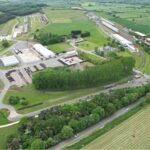Darwin is 20 years old. Jacqueline Starr, Chief Executive at the Rail Delivery Group (RDG), explains what it is and why we should care
Darwin is one of the most critical systems serving the industry, which RDG maintains and continually improves in partnership with our supplier, Thales GTS.
Darwin is the system which powers all the realtime information which customers use to check the status of their train journey, such as, customer information screens, journey planners and third-party retailer sites. When you look up the status of your train on Citymapper, Google Maps or the National Rail Enquiries app, you are accessing information provided by Darwin.
In this digital age, we take this kind of service for granted, and it is right that customers should have live information at their fingertips. Knowledge is power and if you know what’s happening to your train service, you can decide how to make best use of your time – the most precious commodity there is.
Information also reassures us. As inconvenient as delays to our journeys can be when there’s disruption on the network, it becomes a little easier to tolerate if we know what the issue is and have an idea of how quickly it can be resolved.
Today, Darwin has over 1225 users and processes over 9 billion requests for real-time train information from customers annually. But how was the Darwin concept born? Twenty years ago, there was a myriad of different real-time systems feeding customer information screens, each of these systems using their own algorithms and working in isolation.
This resulted in confusion for the customer. For example, a customer information screen in Swindon could be showing completely different live information from a customer information screen in Bristol Temple Meads. How was the customer to know what to believe?
Darwin was created to solve the problem of multiple realities by providing a single source of the truth – one universal and accurate source of live information. This solution was welcomed by the industry, with Darwin winning the National Rail Innovation Award in 2004.
Over the past 20 years, Darwin has been adopted across the industry by parties who have seen the necessity in their customers having access to this truth.
In 2005, Darwin was integrated with the National Rail Journey Planner. In 2009, the National Rail Enquiries app launched, powered by Darwin, and in 2011, a programme of work initiated the roll out of Darwin to all operators across the network.
When this was completed in 2016, more than 66 standalone customer information screen systems were linked together for the first time, providing customers with one consistent truth.
In 2017, train loading data was introduced so that customers could see how busy certain train services were, and even, how busy the carriages on those trains were. And, in recent years, Darwin has been further developed to provide even more granular and accurate data for customers.
But what of the future? It is widely recognised that train travel needs to be made more accessible for everyone, and plans are in the pipeline for more train loading data enhancements.
This will mean that customers will have access to more details about their train, such as the location of accessible seats and toilets, as well as real-time information on their train formation.
We are also cognisant that technology continues to evolve at a rapid pace, and no system can remain static and hope to provide customers with the same level of service. Therefore, a few weeks ago, in mid-February, the Darwin Evolution project was launched – a large scale initiative, which operators have endorsed and invested into.
Darwin Evolution will upgrade the architecture of the Darwin platform, improving the system’s reliability and resilience and ensuring that it can adapt to the inevitable technological advances of the future.
I believe that reflection and self-awareness are vital to the success of any industry. In creating a simpler, better railway, it’s important that we acknowledge areas where we need to improve upon, and where reform is needed. However, it’s equally important to celebrate and build upon our successes, like Darwin.
By Jacqueline Starr, Chief Executive at the RDG



